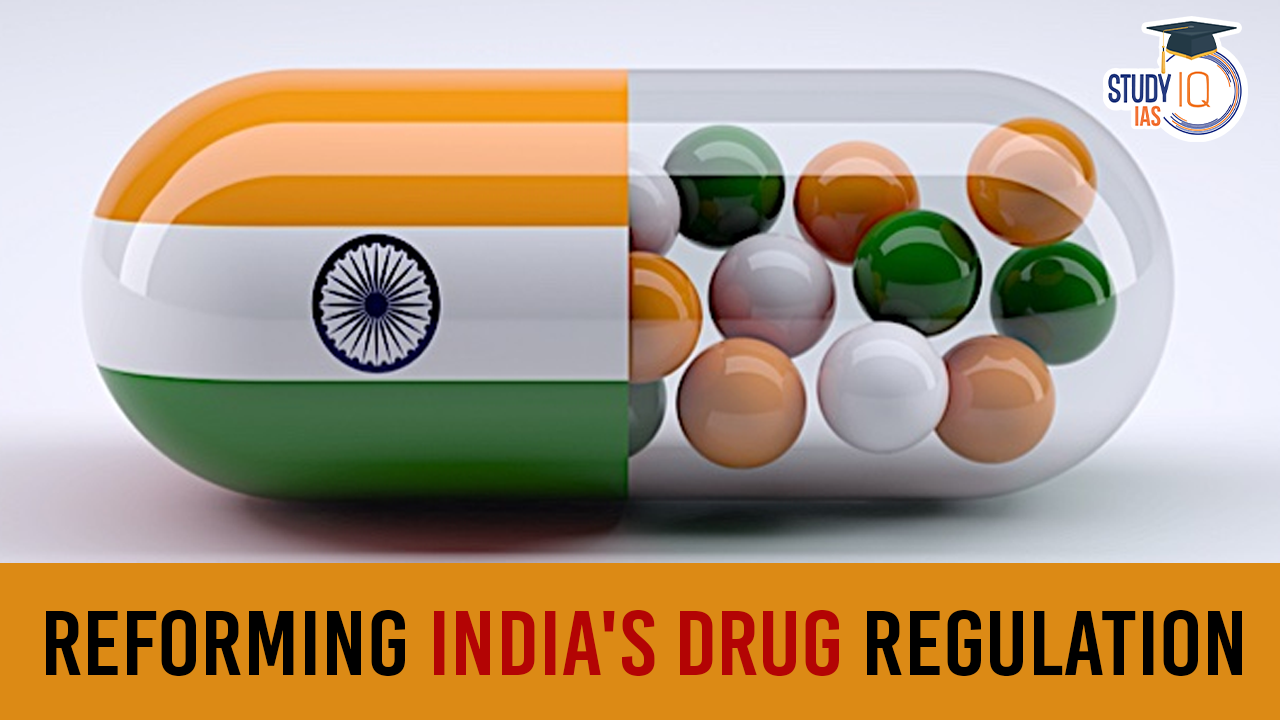Table of Contents
Earlier this year the Drugs Controller General of India (DCGI) announced policy initiatives on three issues: recall guidelines, guidelines on good distribution practices and the use of similar brand-names by pharmaceutical companies for their drugs. Despite their potential, the measures face serious limitations.
3 Guidelines for Reforming India’s Drug Regulation
- Recall guidelines: These are designed to promptly remove drugs from the market if they fail testing in government laboratories.
- Guidelines on good distribution practices: These focus on regulating the storage and distribution of drugs during transit and sale to ensure safety and quality.
- Measures against confusing brand names: These aim to prevent prescription errors, where incorrect drugs are dispensed to patients, potentially causing harm.
Report and Judgements on Similar Issues
- 59th Report of the PSC (2012): The Department Related Parliamentary Standing Committee (PSC) on Health & Family Welfare highlighted similar issues included:
- Lack of recall guidelines
- Lack of standards for drug storage
- Confusing brand names
- Recall Guidelines: Identified in 1976 by the Drugs Consultative Committee (DCC), which observed that drugs banned in one state were still sold in neighbouring states.
- Storage Standards: Raised by the Supreme Court in 1974 (Swantraj & Ors vs. State of Maharashtra).
- Bhagirath Palace Raid (2019): Revealed poor storage practices for vaccines and drugs.
- Similar Brand Names: Addressed by the Supreme Court in 2001 (Cadila Healthcare Limited vs. Cadila Pharmaceuticals Limited).
Limitations to Measures introduced
- Lacks Enforceable Recall Guidelines: The DCGI announced guidelines in 2012, 2017, and most recently in 2023, but none of these have legal backing.
- Only the Ministry of Health has the authority to make these guidelines binding under the Constitution.
- Neglection of Good Distribution Practices: Faced repeated delays despite long standing recognition of their importance.
- 2013: After the PSC report, there was a proposal to adopt good distribution practices guidelines formulated by the World Health Organization (WHO) and make them legally binding.
- However, opposition within the DCC stalled this initiative, citing difficulty in implementation across India’s vast number of retail outlets (around six lakh).
- 2019: The issue was revived after poor storage practices were discovered in New Delhi’s Bhagirath Palace wholesale market.
- The DCC agreed to make the guidelines binding, but the government has delayed their implementation through further consultations with stakeholders.
- 2013: After the PSC report, there was a proposal to adopt good distribution practices guidelines formulated by the World Health Organization (WHO) and make them legally binding.
- Confusing Brand Names: Despite being flagged by the Supreme Court in 2001 and the Parliamentary Standing Committee in 2012, the government failed to take effective action on the issue of confusing pharmaceutical brand names.
| Weak rule in Addressing the issue of Confusing Brand Names | |
| Self-Declaration Rule introduced by the Government |
|
Other Challenges
- Leadership Failure: There is a consistent failure in leadership within the Ministry of Health regarding drug regulation reform.
- Lack of Expertise: The joint secretary, typically from the All India Services, lacks domain expertise and institutional knowledge, which hinders effective policymaking.
- Stalling by Stakeholders: Repeated consultations with pharmaceutical industry stakeholders allow trade associations to stall necessary reforms using various tactics.
- Bureaucratic Delays: Bureaucratic reliance on repeated consultations further delays concrete action on drug regulation issues.
Potential for Change
To break this cycle of inaction, there is a call for direct intervention from the Prime Minister’s Office (PMO). Without this intervention, it is unlikely that the necessary reforms will be implemented


 NASA Parker Solar Probe Flies Closer to ...
NASA Parker Solar Probe Flies Closer to ...
 Silvaguard Drone, Purpose and Working Me...
Silvaguard Drone, Purpose and Working Me...
 India’s Deep Sea Technology, Need and ...
India’s Deep Sea Technology, Need and ...





















